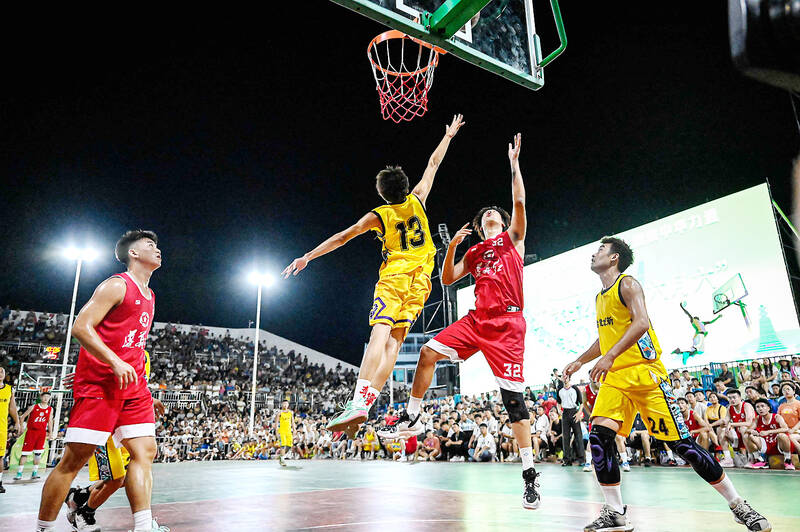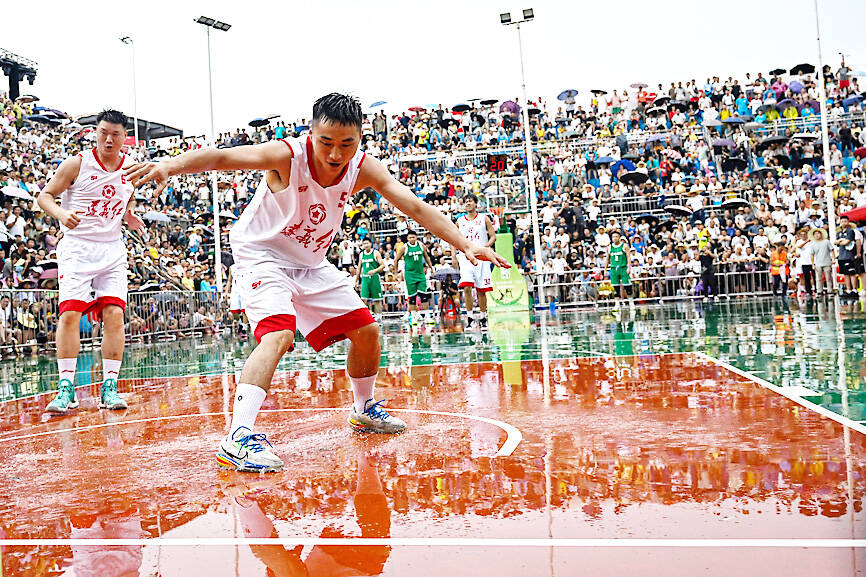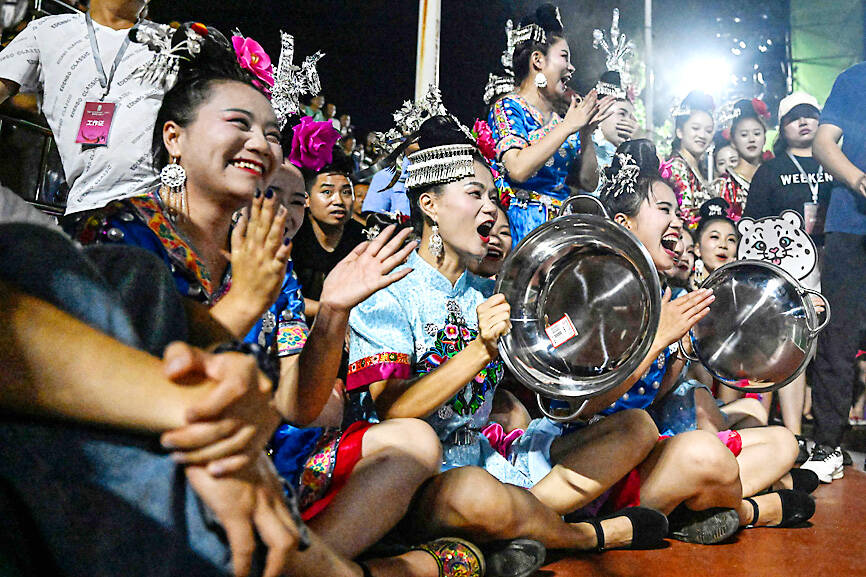Thousands of raucous Chinese basketball fans pack tightly into a floodlit stadium filled with swirling fog, eager to spur on the teams battling in the tournament final.
It is almost midnight in Taipan — a remote village in southwest Guizhou Province — but the championship game is only just getting under way after a weekend of action.
Clanging pots and pans punctuate the hum of the crowd in the steep main stands, while millions of online viewers and social media users hold their breath as the jump ball is tossed.

Photo: AFP
This is China’s village basketball, a grassroots phenomenon that has spiraled in the past few years from a humble local tradition into a viral hit and staple of Beijing’s propaganda machine.
Basketball is hugely popular in the country, but widespread corruption and recent investigations into match-fixing within the CBA, China’s top domestic league, have discouraged many fans and diverted their attention elsewhere.
Athletes in “CunBA” — with “cun” meaning village in Chinese — are all amateurs, and the prizes are simple platters of roast meat but it is the pure electricity of the games that keeps fans and players hooked.

Photo: AFP
“As soon as I arrived in Taipan village, the first thing I sensed was a feeling of enthusiasm and excitement,” Xia Wenxian said.
Xia, 30, has come as part of a team proudly representing his home village of Gaoding, tucked away in the rugged hills of Guizhou more than 100km away.
“Our CunBA has the same competitive sporting spirit as the CBA and NBA,” Xia said, as he prepared for his team’s crucial semi-final later that evening.

Photo: AFP
The tradition of holding annual basketball competitions goes back decades in Taipan, a village in minority-dominated Qiandongnan Miao and Dong Autonomous Prefecture, but only in the past few years has the concept caught on beyond the local area.
It is an unlikely site for a national tourist attraction, but the roaring success of the CunBA on Chinese social media and glowing praise by official media have brought throngs of visitors this summer.
In Taipan’s main thoroughfare on the afternoon before the final, locals in traditional Miao clothing lay out fruit and other items for sale as a police helicopter makes noisy circles above and eager spectators arrive from far and wide.
Organizers say the densely packed village stadium holds more than 20,000 fans — more than 16 times Taipan’s population of 1,200.
Xinhua news agency said that collective online viewership of CunBA competitions has topped 100 million.
The rise of village basketball has provided a golden opportunity for businesses and politicians to capitalize on the public ardor.
A brochure handed out in Taipan by the local county’s culture and tourism bureau expounds upon CunBA’s recent success, calling it “a window to observe Chinese-style modernization,” a slogan often employed by the Chinese Communist Party.
In between the sometimes rain-soaked contests, there are impassioned musical performances featuring dancers from minority groups wearing brightly colored clothing, projecting a rosy image of ethnic harmony and respect for local customs.
Chinese state-backed media has also jumped in, with the Global Times saying that CunBA is “aimed not only at enriching the leisure activities of rural residents but also at promoting rural revitalization and the construction of a strong agricultural nation.”
During halftime at one game, fans waved dozens of huge Chinese national flags while performers in costumes resembling the military uniforms worn by the People’s Liberation Army in the 1940s marched across the court.
Crimson banners adorn the village’s buildings, with one reading “rural sports, letting the light of the countryside illuminate the future.”
“CunBA, unite and work hard, advance forward bravely,” another reads.
Above the court, a sign reads: “All ethnic groups enjoy sporting events together, carrying forward Chinese spirit, gathering Chinese power.”
As CunBA grows in popularity, so too does its profitability.
Late last month, NBA star Jimmy Butler visited Taipan village, where he was greeted by thousands of adoring fans and players with whom he dribbled and made practice shots on the court.
Butler, who earlier this year led his Miami Heat to an appearance at the NBA Finals, is an official marketing partner of leading Chinese sportswear brand Li-Ning.
One week after the NBA star left, Taipan village was still buzzing with excitement.
Li Wending, 44, brought his two sons — both huge fans of US star Stephen Curry — from neighboring Hunan to watch the final day’s play.
“The atmosphere at these village games is always amazing,” Li said. “For CBA games, we can just watch them online, but for CunBA, it’s so much better to come to the actual site and experience the excitement of the fans.”

Shohei Ohtani and Clayton Kershaw on Friday joined their Los Angeles Dodgers teammates in sticking their fists out to show off their glittering World Series rings at a ceremony. “There’s just a lot of excitement, probably more than I can ever recall with the Dodger fan base and our players,” manager Dave Roberts said before Los Angeles rallied to beat the Detroit Tigers 8-5 in 10 innings. “What a way to cap off the first two days of celebrations,” Roberts said afterward. “By far the best opening week I’ve ever experienced. I just couldn’t have scripted it any better.” A choir in the

After fleeing Sudan when civil war erupted, Al-Hilal captain Mohamed Abdelrahman and his teammates have defied the odds to reach the CAF Champions League quarter-finals. They are today to face title-holders Al-Ahly of Egypt in Cairo, with the return match in the Mauritanian capital, Nouakchott, on Tuesday next week. Al-Hilal and biggest domestic rivals Al-Merrikh relocated to Mauritania after a power struggle broke out in April 2023 between the Sudanese army and a paramilitary force. The civil war has claimed tens of thousands of lives and displaced more than 12 million people, according to the UN. The Democratic Republic of the Congo-born Al-Hilal

Shohei Ohtani, Teoscar Hernandez and Tommy Edman on Thursday smashed home runs to give the reigning World Series champions the Los Angeles Dodgers a 5-4 victory over Detroit on the MLB’s opening day in the US. The Dodgers, who won two season-opening games in Tokyo last week, raised their championship banner on a day when 28 clubs launched the season in the US. Dodgers manager Dave Roberts shuffled his batting lineup with all four leadoff hitters finally healthy as Ohtani was followed by Mookie Betts, then Hernandez and Freddie Freeman in the cleanup spot, switching places with Hernandez. “There’s a Teoscar tax to

Matvei Michkov did not score on Monday, but the Philadelphia rookie had a hand in both goals as hosts the Flyers earned a 2-1 victory over the Nashville Predators. Ryan Poehling and Jamie Drysdale got the goals for the Flyers (31-36-9, 71 points), who won their third straight. Michkov and Travis Konecny assisted on both. Ivan Fedotov stopped 28 shots to earn his first win since March 1, ending a personal six-game losing streak. Zachary L’Heureux got the lone goal for Nashville. Michael McCarron and Brady Skjei got the assists for the Predators (27-39-8, 62 points), who have just four goals in their